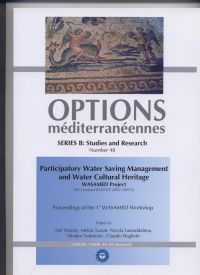| p. 3-20 | Article suivant |
Participatory irrigation management: gaining benefits and rising problems
In most developing countries, irrigation development projects and their operation and management are heavily dominated by the public sector. Government-operated irrigation systems are often poorly maintained with steadily deteriorating infrastructure. Yet, some of these same systems show notable improvement when their management is transferred to water users' associations (WUAs) which enter into contracts with Government for operating and maintaining portions of the system or, in some cases, entire systems. Nevertheless, transferring substantial management authority to a locally-based organization is a complicated undertaking and may involve changes in national policy, regulations and organizational structure, creation of new organizations at the local level, transference of equipment ownership, and changes in personnel, in addition to the shifting of management functions to the new managers. Any undertaking of this complex will almost certainly create new problems which did not exist before or were not previously evident. In this paper, these problems are termed 'second generation problems' and are analyzed from different perspectives: the water user, the irrigation association, the irrigation agency and the Government.
- [ Afficher ]
- [ Télécharger ]
- [ Exporter la citation ]
Vous pouvez télécharger la citation au format :
- [ Imprimer ]
-
Mots-clés
GESTION DE PROJET, GESTION DES EAUX, IRRIGATION, PAYS EN DEVELOPPEMENT, RESEAU D'IRRIGATION, RESSOURCE EN EAUCiter cet article
Hamdy A. Participatory irrigation management: gaining benefits and rising problems. In : Hamdy A. (ed.), Tüzün M. (ed.), Lamaddalena N. (ed.), Todorovic M. (ed.), Bogliotti C. (ed.). Participatory water saving management and water cultural heritage. Bari : CIHEAM, 2004. p. 3-20. (Options Méditerranéennes : Série B. Etudes et Recherches; n. 48). 1. WASAMED (Water Saving in Mediterranean Agriculture) Workshop, 2003/12/15-19, Sanliurfa (Turkey). http://om.ciheam.org/om/pdf/b48/05002278.pdf



